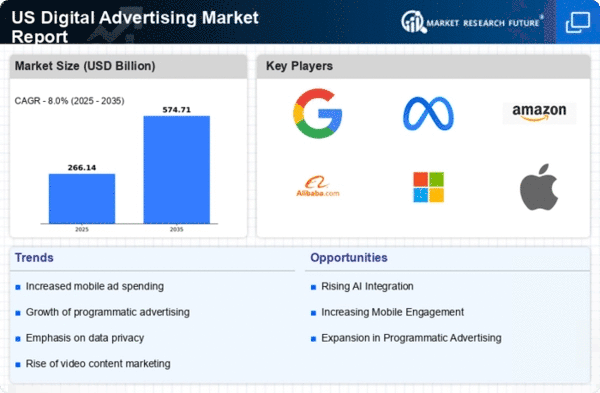Regulatory Changes
Regulatory changes are emerging as a critical driver in the digital advertising market. With increasing scrutiny over data privacy and consumer protection, advertisers must navigate a complex landscape of regulations. The implementation of laws such as the California Consumer Privacy Act (CCPA) has prompted businesses to rethink their data collection and advertising strategies. Compliance with these regulations is essential for maintaining consumer trust and avoiding potential penalties. The digital advertising market is adapting by prioritizing transparency and ethical practices in advertising. This shift may lead to a more responsible approach to data usage, ultimately benefiting both consumers and advertisers in the long run.
Growth of E-commerce
The expansion of e-commerce in the US has been a pivotal driver for the digital advertising market. As online shopping continues to gain traction, businesses are increasingly allocating budgets to digital advertising to capture consumer attention. In 2025, e-commerce sales are projected to reach approximately $1 trillion, indicating a robust growth trajectory. This surge compels brands to invest in targeted digital advertising strategies to enhance visibility and drive conversions. The digital advertising market is thus experiencing a shift, with companies leveraging data analytics to optimize their campaigns and reach potential customers effectively. The integration of e-commerce platforms with social media advertising further amplifies this trend, allowing brands to engage with consumers in real-time and tailor their messaging to specific demographics.
Increased Mobile Usage
The proliferation of mobile devices has significantly influenced the digital advertising market. As of 2025, mobile advertising is expected to represent nearly 70% of total digital ad spending in the US. This shift is driven by the growing reliance on smartphones for daily activities, including shopping, social networking, and information consumption. Advertisers are thus compelled to optimize their campaigns for mobile platforms, ensuring that content is accessible and engaging on smaller screens. The digital advertising market is adapting to this trend by developing mobile-first strategies, including responsive design and location-based targeting. This focus on mobile engagement is likely to enhance user experience and drive higher conversion rates.
Advancements in Technology
Technological advancements are reshaping the landscape of the digital advertising market. Innovations such as artificial intelligence (AI) and machine learning are enabling advertisers to analyze consumer behavior more effectively and personalize their campaigns. In 2025, it is estimated that AI-driven advertising will account for over 30% of the total digital advertising expenditure in the US. These technologies facilitate real-time bidding and programmatic advertising, enhancing the efficiency of ad placements. Moreover, the rise of augmented reality (AR) and virtual reality (VR) in advertising offers immersive experiences that captivate audiences. As the digital advertising market embraces these technologies, advertisers are likely to see improved engagement rates and higher returns on investment.
Shift Towards Sustainability
The growing emphasis on sustainability is influencing the digital advertising market. As consumers become more environmentally conscious, brands are increasingly aligning their advertising strategies with sustainable practices. In 2025, it is anticipated that over 50% of consumers will prefer brands that demonstrate a commitment to sustainability. This trend compels advertisers to highlight their eco-friendly initiatives in their campaigns, thereby enhancing brand loyalty and consumer engagement. The digital advertising market is responding by integrating sustainability messaging into their strategies, utilizing platforms that promote green practices. This alignment with consumer values not only fosters a positive brand image but also drives competitive advantage in a crowded marketplace.
















